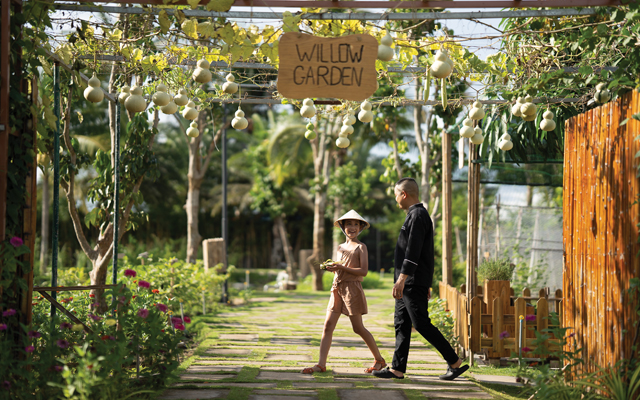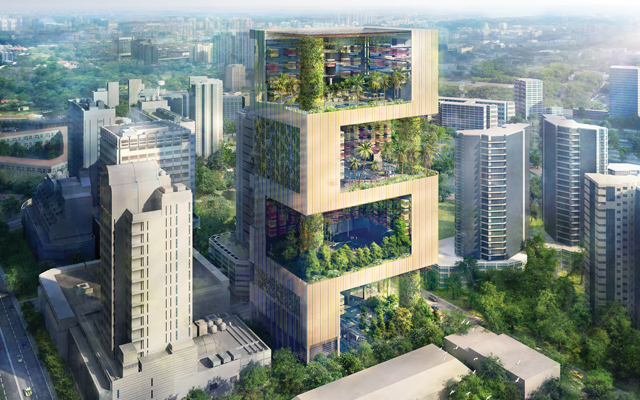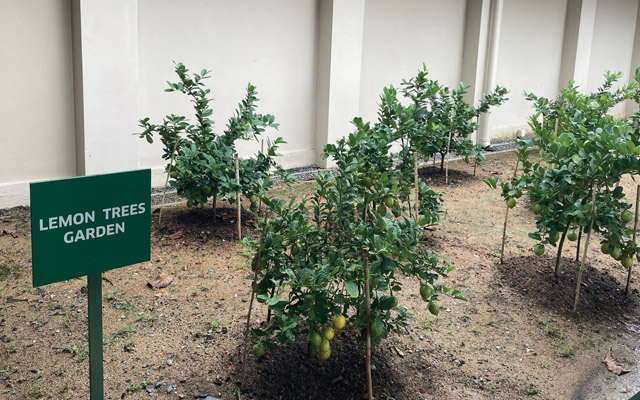Hotels’ intensifying environmental-focused pursuits are creating improved experiences for guests, be it through architectural designs that bring soothing nature indoors or meals that are big on flavour and small on emissions
A glimpse of Pan Pacific Hotels Group’s (PPHG) Parkroyal Collection property portfolio will easily conjure visions of an alternate universe where lush, leafy giant structures dominate the skyline.
This is the result of the brand’s decision to make iconic and biophilic design a cornerstone of its architectural direction. Its first biophilic hotel, Parkroyal Collection Pickering in Singapore, is such a success that both its design and sustainable achievements have earned it numerous awards, media coverage and social media posts.

Parkroyal Collection Marina Bay in Singapore, the second property to open under the brand, is no shadow of its sister. Its sky-lit indoor atrium – said to be South-east Asia’s largest – is home to more than 2,400 plants, trees, shrubs and ground covers.
When Parkroyal Collection Kuala Lumpur opened in June 2022, it carried the brand’s biophilic design promise, with a vertical garden facade and roof terraces showcasing 1,208m² of plants and trees.
The fourth development to come in 2026, the Parkroyal Collection Faber House in Singapore, will be another one to watch for fans of biophilic design.
The 250-key hotel will form part of an 18-storey development in the heart of Singapore’s shopping belt. Its stellar address aside, the hotel will draw eyeballs with its façade of intense outdoor greening and cascading water features, bringing much needed greenery to the district packed with malls.
“But these are more than just aesthetics,” said Choe Peng Sum, PPHG’s CEO, during a panel discussion hosted under the Hospitality Conference 2023 by SHATEC – The International Hotel & Tourism School (Singapore) earlier in March.
“All that greenery gives these properties a different quality of air and cools the air naturally. Reducing just two degree Celsius without the use of air-conditioning means substantial energy savings,” he explained.
Furthermore, with these properties adopting stringent environmentally sustainable operations, such as waste and water management, beyond their pretty biophilic features, Choe emphasised that going green is a sensible business move.
Citing an example, Choe said securing the Green Mark Platinum certification from the Singapore Building and Construction Authority for his company’s soon-to-launch Pan Pacific Orchard resulted in a S$120 million (US$90 million) green loan, up to three per cent additional gross floor area – which he said could mean an extra floor of guestrooms, and cash incentive to lower upfront cost of energy efficiency retrofits.
Indeed, PPHG’s sustainability efforts flow through its entire portfolio. It works closely with parent company UOL Group and respective hotel owners to determine the ideal design for the property, and if possible, incorporate environmentally friendly systems.
A PPHG spokesperson told TTG Asia: “To invest in complete biophilic design with environmentally-friendly systems is not cheap, and not easy – it is crucial to have the hotel owners’ buy-in and to believe in the returns, both in long-term cost savings and in securing strong brand equity.”

Top-level commitment
At Meliá Hotels International, sustainability commitment has top-level involvement. Its sustainability directions are led by a Sustainability Committee formed in 2020, with two members of the Executive Committee holding seats.
The company’s sustainability vice president, Lourdes Ripoll de Oleza, told TTG Asia: “This fact gives it the executive impetus at the highest level necessary to ensure that decisions are passed downstream to the operation. This committee maintains a close link with our Board of Directors as it reports directly to one of its committees.”
At the same time, day-to-day operations are assumed by the Sustainability department, which reports directly to the executive vice president and CEO. Owners are also an essential part of the commitment, and they would “share their thoughts on sustainability, and address concerns and potential actions that we can promote together”.
Sofitel Singapore Sentosa Resort & Spa, which has started to establish a farm on its premises, has its sustainability strategy and goals championed by members of a task force comprising key departments such as housekeeping, engineering, human resources, culinary, purchasing, food and beverage, front office, sales and marketing communications. This task force supports the resort’s cluster general manager Cavaliere Giovanni Viterale and general manager Robert Gauer.
Vehicle for education
Hotels committed to sustainability are realising that they can play a part in educating their guests on how to be sustainable back home.
Meliá Hotels International took advantage of Earth Day on April 22 this year to offer guests at its South-east Asian properties interesting activities rooted in sustainability concepts. Sol by Meliá Benoa Bali, Indonesia, for instance, hosted a beach Cleaning Blitz with opportunities for guests to join in, along with sustainable craft activities for kids where they painted bags and for adults to make torches using waste cooking oil.

Earth Day may be over by now, but learning opportunities at Meliá properties continue. Sol by Meliá Phu Quoc offers candle-making workshops using old candles; Meliá Phuket Mai Khao offers upcycled bottle painting; Meliá Bali runs a coral reef recovery project with local non-profit, Nusa Dua Reef Foundation, and invites guests to support it with purchases of coral plantation activities.
Sofitel Singapore Sentosa Resort & Spa’s farm, set up in 2022 as part of its food resiliency measures, has helped to provide more sustainable dining and cocktail options. A lemon tree garden now feeds the culinary and mixology teams. At LeBar, lemon leaves from the garden and watermelon tincture made from watermelon skin obtained from the kitchen are used to concoct a refreshing Sentosa Sling. The garden recently welcomed an Amalfi lemon plant, gifted by local Peranakan culinary doyenne Violet Oon.
“We are very much looking forward to an Amalfi lemon tree in the coming months. Additionally, our team has just planted a crop of vegetables and herbs on an adjacent plot of land facing the South China Sea,” shared Viterale.
The property is also sharpening its farm-to-table offering. In March 2023, it was awarded the Singapore Food Agency Farm-To-Table Recognition (Highest Tier) with at least 15 per cent of local produce sourced across three or more food categories (Hen Shell Eggs, Leafy Vegetables, Beansprouts and/or Fish categories).
“This inaugural award reinforces our resort’s commitment to supporting local producers and at the same time, ensures we are part of a resilient food supply chain that is in alignment with the Singapore Green Plan 2030. In addition, it ensures higher quality and fresher ingredients due to a shorter period of transportation and enables the chefs to showcase uniquely created menus that highlight local flavours,” said Viterale.
Further, it partners with food tech brands such as Very Dairy and OnlyEg to create innovative yet healthy menu offerings.
At PPHG properties, guests learn to live day-to-day with reduced environmental impact. Those staying at Pan Pacific Orchard are able to refill their bottles with fresh drinking water from in-room filtered water dispensers, while long-staying guests at Parkroyal Nay Pyi Taw can grow their own plants in a plot at the Organic Garden.
“While many of our investments and efforts run in the background and are not visible to guests, we find creative and engaging means to incorporate sustainability into the guest experience,” said the PPHG spokesperson.




















